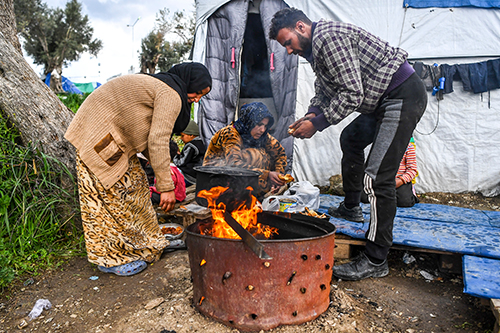Bayes Business School Research Highlights 2021
Bayes experts have once again showcased cutting-edge and industry-leading research in 2021, across the Faculties of Management, Finance and Actuarial Science and Insurance. Here is a look back on some of the most impactful pieces of research.
Watch and learn: Learning by observation reduces cognitive bias
Research co-authored by Dr Irene Scopelliti showed that learning by observation could be just as effective as ‘learning by doing’ as a training intervention, which could lead to better decision-making among teachers, industry and government officials.
The study carried out three experiments that tested participant’s judgement both before and after different training interventions, and found that observational learning improved decision-making by reducing susceptibility to cognitive biases and were also more effective than instructional learning techniques.
The Research was published in Organizational Behavior and Human Decision Processes.
 London pubs and coffee shops must capitalise on flexible workers increased desire for work and social balance
London pubs and coffee shops must capitalise on flexible workers increased desire for work and social balance
Research co-authored by Dr Laetitia Mimoun found that flexible workers increasingly value ‘third space’ environments as they work remotely.
The report, published in the Journal of Service Research, found spaces including coffee houses, pubs, hotel bars, churches, museums, libraries, and train stations offered better productivity and greater motivation than home working, better relationship between staff and clients, more social possibilities and the likelihood of romantic encounters.
With more people working remotely during the pandemic, recommendations were made to businesses to better entice customers and make the most of this possible increased revenue.
 How can social media and influencers contribute towards societal good?
How can social media and influencers contribute towards societal good?
Dr Wanqing Zhang’s study of rice farmers in China demonstrated the power of social influencers to spread positive messages about the impact of environmentally-friendly pesticide products. Dr Zhang’s research found that including respected and influential figureheads among a community within social messaging groups has a positive, low cost impact on the spread of useful information, increased communication and the adoption of the product.
The study was published in the Journal of Marketing.
UK inbound investment remains high in the face of Brexit
The Mergers and Acquisitions Attractiveness Index Score (MAAIS), compiled by Dr Naaguesh Appadu, showed that UK inbound and domestic investment remained high in the aftermath of Brexit, with the UK rising two places globally into 5th place, behind USA, Singapore, Germany and the Netherlands.
The study used 21 indicators to determine the attractiveness of 148 countries, with weighting also applied to actual M&A activity across the previous year.
Other notable rankings included Saudi Arabia climbing 20 places due to improvements in its socio-economic factors, and China continuing to fall down the list due to a poor ESG score.
 Top-level sportsmen may live 13 per cent longer than the average man
Top-level sportsmen may live 13 per cent longer than the average man
Research by Professor Les Mayhew and the International Longevity Centre (ILC) suggested significant differences in the longevity of elite sportsmen in football, cricket, rugby union, tennis, golf, boxing and horse racing compared with males in the general population that were born in the same year.
The study goes further to indicate that among those alive today, there are 36 per cent more Wimbledon finalists than would be expected if they had the same mortality as the average male, as well as 16 per cent more England rugby union captains, 14 per cent more England cricket captains, and 9 per cent more golf Open Championship champions.
Customers’ needs must be put first if financial services firms are to regain lost trust
A white paper from Professor Gianvito Lanzolla revealed financial companies’ methods for assessing people’s needs are not fit for purpose and too closely aligned with their own strategies and regulatory guidelines.
Professor Lanzolla’s paper surveyed 2,120 people, exploring how well-matched their financial needs are to the services they are receiving. Results showed that consumers do not trust the advice they receive from banks and advisors, believing that financial profits are an overarching priority rather than customer satisfaction.
The power of capability transfer: how cross-border M&A affects ESG standards
Research led by Dr Zhenyi Huang looking into the effects of cross-border M&A between emerging and developed markets found that deals produced a positive aggregate effect on environmental, social and governance (ESG) standards for developing countries.
Although more developed markets, such as the UK, USA and Australia maintained higher ESG scores than their developing counterparts post-deal, gaps were narrowing due to globalisation and increasing awareness of ESG practices – as well as greater access to knowledge and advanced technology.
 Longer stays in refugee camps increase cases of acute mental illness
Longer stays in refugee camps increase cases of acute mental illness
A study on the Moria refugee camp, co-authored by Dr Francisco Urzua and Moria Medical Support (MMS), showed that acute mental health crises were significantly linked with the length of time somebody stayed in a refugee camp.
Longer stays are strongly associated with incidents of self-harm or attempted self-harm, a suicide attempt requiring hospital care, and a state of unease constituted by anxiety, nervous agitation or undirected aggression.
The research was published in BMC Public Health.
Battle-hardened fund managers produce higher returns during times of recession
Research from Professor Meziane Lasfer showed that the decision-making of fund managers is largely influenced by economic conditions at the start of their careers.
The study showed fund managers who began their careers in a recession tend to produce higher returns overall than those who started in better economic times, as well as being larger in size and more industry-concentrated.
The study is published in the Journal of Corporate Finance.
Life expectancy falls as a result of COVID-19
Professor Steve Haberman co-authored a report into how COVID-19 had affected life expectancy. The report, titled ‘The Covid-19 Pandemic’, reveals that life expectancy fell by 1.3 years for men and 0.9 years for women in 2020.
The impact of the virus was also found to be more severe on ethnic minorities and disproportionately high in areas of deprivation. 76 per cent of all Covid deaths in the ‘high risk’ category were also impacted by existing health conditions, obesity and age.
Adopting models of the past pave a path to a brighter future for all at business schools
A paper co-authored by Professor André Spicer and Professor Caroline Wiertz explored the history of UK business schools, and picked out traits from each of five identified existing or past models that could help lead to more forward-thinking and expansive business schools, as well of those that could hinder their progress and prevent them from reaching their full potentials.
‘The Future of the Business School: Finding Hope in Alternative Pasts’ is due for publication in the Academy of Management Learning & Education.
 Shopping trolleys save shoppers money as pushing reduces spending
Shopping trolleys save shoppers money as pushing reduces spending
A study led by Professor Zachary Estes showed that standard shopping trolleys reduce the amount customers spend on their shopping by up to 25 per cent compared to those using trolleys with parallel handles, due to the physical motion of pushing them.
The research builds on psychological reports that find activating the bicep muscles – as happens when using a trolley with parallel handles – is associated with things we like to do.
The research is published in the Journal of Marketing.
